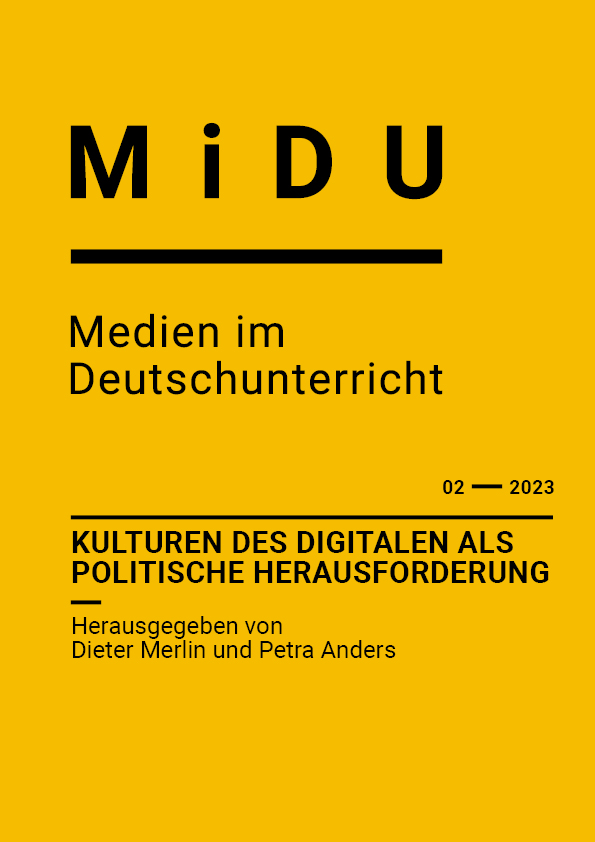Von Bertolt Brechts Radiotheorie zu den sozialen Medien. Theoretische und historische Verbindungslinien und Reflexionsanstöße für den Deutschunterricht in ein er digitalisierten Gesellschaft
DOI:
https://doi.org/10.18716/OJS/MIDU/2023.2.6Schlagwörter:
Brecht, Demokratie, Deutschunterricht, Dystopie, Internet, Lehrstück, Medientheorie, Radio, Radiotheorie, Rundfunk, UtopieAbstract
Der Beitrag widmet sich zunächst historischen Phasen der Medienentwicklung sowie den diese begleitenden medienkritischen Diskursen. Ausgangspunkt sind dabei Bertolt Brechts utopische Vorstellungen zur Verwendung des damals neuen Mediums Radio in den 1920er Jahren. Brecht forderte eine die Hörerschaft beteiligende interaktive Verwendung des medialen Apparats, die er mit der Hoffnung auf eine demokratischere Gesellschaft verband. Im historischen Vergleich werden dann Parallelen zwischen Brechts radiotheoretischen Überlegungen und den Erwartungen auf-gezeigt, die sich in den 1990er Jahren mit der Ausbreitung des Internets verbanden. Verfolgt man den Diskurs um die politischen und kulturellen Auswirkungen des Internets bis in die Gegenwart, dann zeigt sich, wie utopische Erwartungen in dystopische Befürchtungen umschlagen. Diesen Beobachtungen zur Seite gestellt wird eine knappe Darstellung von Brechts praktischen Versuchen zur „interaktiven“ Nutzung des Radios für die Aufführung literarischer Texte. Das wichtigste Beispiel hierfür ist Brechts Radiolehrstück „Der Flug der Lindbergs“. Sowohl Brechts experimentelle Verwendung des Radios als auch die technikbegeisterte Botschaft des Stückes wirken aus heutiger Sicht befremdlich, geben aber gerade dadurch Anregung zum Nachdenken über das Verhältnis von Mensch, Technik und Natur.
Abstract (english): From Bertolt Brecht‘s radio theory to social media. Theoretical and historical connections and food for thought for teaching German in a digitalised society
The article is first devoted to historical phases of media development and the ac-companying discourses of media criticism. The starting point is Bertolt Brecht‘s utopian ideas on the use of the then new medium of radio in the 1920s. Brecht called for an interactive use of the media apparatus that would involve the listeners, which he linked to the hope for a more democratic society. A historical comparison then reve-als parallels between Brecht‘s radio theoretical considerations and the expectations associated with the spread of the Internet in the 1990s. If one follows the discourse on the political and cultural effects of the Internet up to the present, it becomes apparent how utopian expectations turn into dystopian fears. These observations are juxtaposed with a concise account of Brecht‘s practical attempts at „interactive“ use of radio for the performance of literary texts. The most important example of this is Brecht‘s radio play Der Flug der Lindbergs. This is devoted in content to another new technology of the early 20th century, namely airplane technology. Both Brecht‘s experimental use of radio in the performance of the play and the celebration of flying as a triumph of man and technology over nature in terms of content seem disconcerting from today‘s perspective, however, and provide food for thought about the relation-ship between man, technology, and nature as well as the meaningful use of media.
Downloads
Veröffentlicht
Versionen
- 10.06.2024 (2)
- 24.11.2023 (1)
Ausgabe
Rubrik
Lizenz
Copyright (c) 2023 Andreas Seidler

Dieses Werk steht unter der Lizenz Creative Commons Namensnennung - Keine Bearbeitungen 4.0 International.







